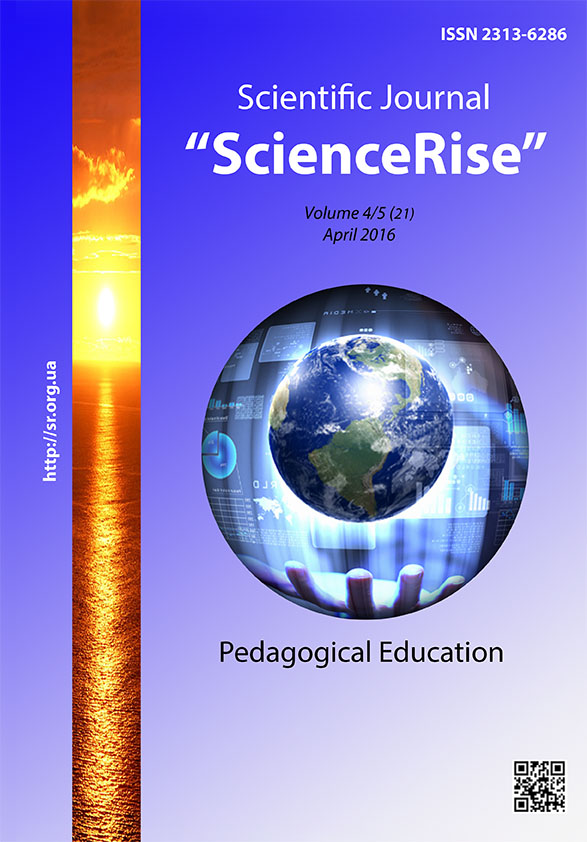Lin-education in the higher technical educational institution in the conditions of transitive economy
DOI :
https://doi.org/10.15587/2313-8416.2016.67238Mots-clés :
lin-education, transitive economy, higher technical education, lin-technologies, lin-strategies, kaizen, saving production, values transformationRésumé
The problem and topicality of research is the study of transforming processes in society according to the value of educational process in the conditions of transitive economy. There were specified the strategies of introduction of the lin-education, exactly, the lin-technologies in the process of professional preparation of the future teachers of the higher technical educational institutions as some kind of investments in the theory and methodology of professional education. There was grounded the system of development of the higher education on the base of saving production. There was determined that introduction of the idea of thrift and prudence in the use of possibilities of educational process in professional preparation of the future specialists in higher technical educational institution are directed on the formation of all types of professional skills of the future specialist as the set of competences in the process of his professional preparation that is the node idea of lin-education. The study of the native labor market allows ascertain that the culture of social dialog of the higher technical education with economy needs from the higher technical educational institution the special prognostication and orientation on the European choice. There was elaborated the lin-strategy of introduction of the “knowledge economy” in the process of professional preparation of the future teachers of the higher technical institutions. The methods of research are: analysis, prognostication, diagnostics, monitoring
Références
The national strategy of education development in Ukraine for 2012–2021. Available at: http://www.meduniv.lviv.ua/files/info/nats_strategia.pdf
Yermakova, S. S. (2013). The theoretical and methodological bases of monitoring of professional preparation of future teachers of higher technical educational institutions. Odessa: the state institution "South Ukrainian national. der. University ei. K. D. Ushinsky", 44.
Harrington, J., Voul, F. (2008). Perfection of knowledge management. Moscow: RIA «Standarty i Kachestvo», 272.
Womak, J., Jones, D.; Adler, Y. (Ed.) (2004). Lean manufacturing: How to eliminate losses and to achieve prosperity of your company. Moscow: Alpina Business Books, 473.
Svitkin, M. Z., Macuto, V. D., Rihmin, K. M. (1999). Quality Management and quality assurance of products on the basis of international standards ISO. Sankt-Petersburg, 234.
Bunderson, С. V., Inouye, D. K., Olsen, J. B.; Linn, R. L. (Ed.) (1989). The four generations of computerized educational measurement. Educational measurement. N. Y.: Macmillan, 367–407.
Melezinek, A. (1997). Engineering pedagogy. Moscow: Publishing house of the Moscow state technical University, 190.
George, M.; Turko, S., Adler, J. (Eds.) (2005). Lean manufacturing + six Sigma: Combining six Sigma quality with lean production speed. Moscow: Alpina Business Books, 360.
Fidelman. G. N., Dedikov, S. V., Adle, Ju. P. (2005). Alternative management: the Path to global competitiveness. Moscow: Alpina Business Books, 186.
Imai, M.; Adler, Y., Spehr, V. (Eds.) (2005). Gemba Kaizen: the Way to cost reduction and quality improvement. Moscow: Alpina Business Books, 346.
Zhigalova, O. V. (2004). Formation of pedagogical competence of a teacher of a technical College. Ufa, 159.
Yermakova, S. S. (2011). Theoretical-methodical bases of monitoring of professional preparation of future teachers of higher technical educational institutions. Odessa: «InPress», 358.
Téléchargements
Publié-e
Numéro
Rubrique
Licence
(c) Tous droits réservés Svitlana Yermakova 2016

Cette œuvre est sous licence Creative Commons Attribution 4.0 International.
Our journal abides by the Creative Commons CC BY copyright rights and permissions for open access journals.
Authors, who are published in this journal, agree to the following conditions:
1. The authors reserve the right to authorship of the work and pass the first publication right of this work to the journal under the terms of a Creative Commons CC BY, which allows others to freely distribute the published research with the obligatory reference to the authors of the original work and the first publication of the work in this journal.
2. The authors have the right to conclude separate supplement agreements that relate to non-exclusive work distribution in the form in which it has been published by the journal (for example, to upload the work to the online storage of the journal or publish it as part of a monograph), provided that the reference to the first publication of the work in this journal is included.

